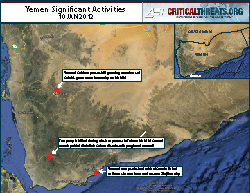 |
The Yemeni government is facing opposition from the streets as it takes steps to implement unpopular terms of the Gulf Cooperation Council (GCC) deal. Even as the political transition process progresses, the Yemeni state remains fragmented. Al Qaeda-linked militants still control territory in south Yemen.
The Yemeni military continues its offensive against the al Qaeda-linked militant group, Ansar al Sharia, in Abyan governorate. Fighting between Yemeni army troops and al Qaeda-linked militants in northern and eastern Zinjibar killed three soldiers and two militants overnight. Saturday, clashes north of Zinjibar killed six militants and one soldier.
The Yemeni Cabinet, appointed after the signing of the Gulf Cooperation Council (GCC) deal, approved a bill granting immunity to President Ali Abdullah Saleh and “those who worked with him in all civilian, military and security state bodies and institutions during his rule.” The bill, submitted by Vice President Abdul Rab Mansour al Hadi, will stand before Yemen’s parliament to be approved as law. UN human rights chief Navi Pillay warned that granting amnesty “would violate Yemen’s human rights obligations.” The U.S. State Department spokesman said this step was “part and parcel of giving [the regime] confidence that [its] era is over, and it’s time for Yemen to be able to move forward towards a democratic future.” Yemen’s election committee appointed regional members to oversee Yemen’s February 21 presidential elections.
Protesters took to the streets calling for parliament to reject the law. One person was killed in Taiz when armed civilians fired on a protest. Tribesmen protecting the protesters fired back, killing one of the attackers. Three other people were injured.
Yemenis also continue to demand accountability for commanders’ and officials’ actions over the past year. Taiz governor Hamoud al Soufi reported that a regional council voted to dismiss the central security chief in Taiz, Brigadier General Abdullah Qairan, for his role in violent crackdowns on protesters. Qairan had been moved from Aden, the heart of a secessionist movement, to Taiz in March as the protests gained momentum. Troops in Ma’rib governorate forced their commander, Brigadier General Ali al Samqi, from their base.
← Previous |
Next → |
